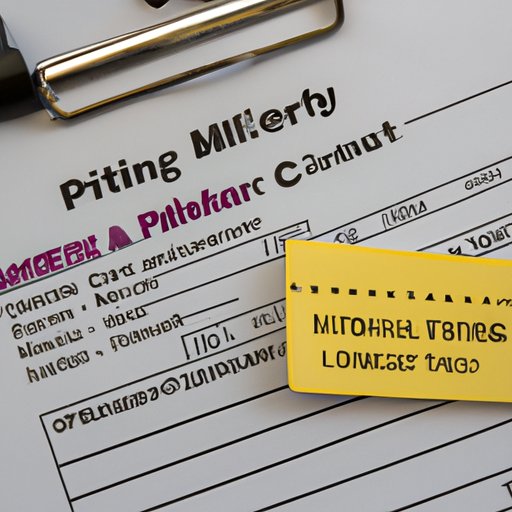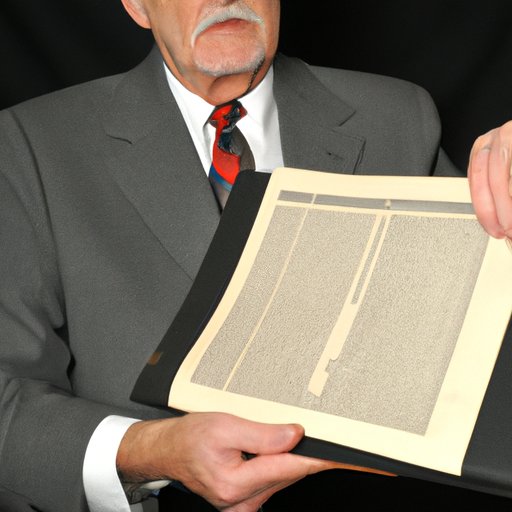Introduction
When you purchase a piece of property, it’s important to understand who owns the mineral rights to the land. Mineral rights are the legal right to access and remove minerals from a certain piece of land. Depending on the situation, the owner of the land may or may not own the mineral rights associated with it. Knowing who owns the mineral rights is key to understanding the full value of the property.
In this article, we’ll explore the various methods for determining who owns the mineral rights to your property. We’ll discuss the importance of consulting a local real estate attorney, reviewing relevant state and federal laws, exploring public records, analyzing historical documents, consulting with a geologist, reaching out to local landowners, and researching case studies of similar properties.
Interviewing a Local Real Estate Attorney to Understand Who Owns the Mineral Rights to Your Property
The first step in determining who owns the mineral rights to your property is to consult a local real estate attorney. An experienced attorney can provide valuable insight into who owns the mineral rights and how to protect your interests. Additionally, they can help ensure that all applicable laws and regulations are followed when conducting your search.
There are several benefits to consulting a real estate attorney when researching who owns the mineral rights to your property. They can provide an unbiased opinion on the matter, as well as explain any potential risks or liabilities associated with the rights. Additionally, they can answer any questions you have about the process and offer advice on how to proceed.
When consulting a real estate attorney, there are some key questions you should ask. These include: who currently owns the mineral rights to the property, what kinds of minerals are included in the rights, and if the rights are transferable. Additionally, it’s important to inquire about any potential restrictions or legal requirements that come with owning the mineral rights.

Reviewing Relevant State and Federal Laws to Understand Who Owns the Mineral Rights to Your Property
Once you’ve consulted with a local real estate attorney, it’s time to review relevant state and federal laws to gain a better understanding of who owns the mineral rights to your property. The legal framework governing mineral rights varies from state to state, so it’s important to familiarize yourself with the laws in your area.
When investigating state and federal laws related to mineral rights, there are a few key areas to focus on. These include the types of minerals that are subject to the rights, any restrictions on the extraction of minerals, and any legal requirements that must be met before the rights can be transferred. Additionally, it’s important to investigate any taxation or royalty obligations associated with the rights.

Exploring Public Records to Uncover Who Owns the Mineral Rights to Your Property
Another way to determine who owns the mineral rights to your property is to explore public records. Most states maintain a database of public records that can be accessed by anyone. These records can provide valuable insight into who holds the mineral rights and any other related information.
When accessing public records databases, it’s important to focus on records related to mineral rights. This includes deeds, leases, and other documents that mention the rights. Additionally, it’s important to investigate any court cases related to the rights, as these can provide valuable information about their ownership.

Analyzing Historical Documents Related to the Land to Determine Who Owns the Mineral Rights to Your Property
In addition to exploring public records, it’s also important to analyze historical documents related to the land. This includes deeds, titles, and other documents that provide information about the land’s ownership over time. These documents can provide valuable insight into who owns the mineral rights to the property and any other related information.
When researching historical documents related to the land, it’s important to pay close attention to any mentions of mineral rights. Additionally, it’s important to investigate records from previous owners, as they may hold valuable information about the rights.

Consulting With a Geologist to Assess Who Owns the Mineral Rights to Your Property
If you’re still unsure of who owns the mineral rights to your property, it may be beneficial to consult with a geologist. A geologist can provide valuable insight into the types of minerals present on the land and who owns the rights to them. Additionally, they can provide advice on the best way to extract the minerals and any potential risks or liabilities associated with doing so.
When selecting a geologist to work with, there are a few important factors to consider. First, it’s important to make sure the geologist has experience in the area where the property is located. Additionally, it’s important to inquire about the geologist’s qualifications and expertise in the field. Finally, it’s important to make sure the geologist is licensed and insured.
Reaching Out to Local Landowners to Learn Who Owns the Mineral Rights to Your Property
Another way to determine who owns the mineral rights to your property is to reach out to local landowners. This includes current and past owners of the land, as well as those who hold the mineral rights. By connecting with these individuals, you can learn more about who owns the rights and any other related information.
When reaching out to local landowners, it’s important to be respectful and courteous. It’s also important to be clear about the information you’re looking for and why you need it. Additionally, it’s important to be prepared to answer any questions they may have about your search.
Researching Case Studies of Similar Properties to See Who Owns the Mineral Rights to Yours
Another useful tool for determining who owns the mineral rights to your property is to research case studies of similar properties. By examining the outcomes of these cases, you can gain a better understanding of who typically owns the rights and any potential risks or liabilities associated with them.
When researching case studies of similar properties, it’s important to focus on cases that are recent and relevant to your situation. Additionally, it’s important to pay close attention to any details related to the ownership of the mineral rights. This includes any restrictions or legal requirements associated with the rights.
Conclusion
Understanding who owns the mineral rights to your property is essential to understanding its full value. In this article, we explored the various methods for determining who owns the mineral rights to your property. These include consulting a local real estate attorney, reviewing relevant state and federal laws, exploring public records, analyzing historical documents, consulting with a geologist, reaching out to local landowners, and researching case studies of similar properties.
(Note: Is this article not meeting your expectations? Do you have knowledge or insights to share? Unlock new opportunities and expand your reach by joining our authors team. Click Registration to join us and share your expertise with our readers.)
